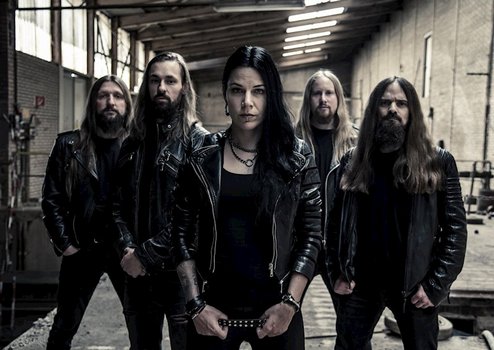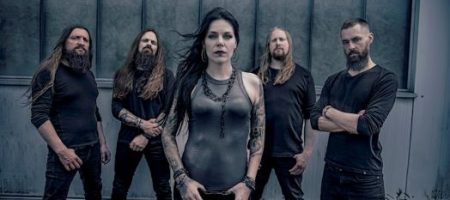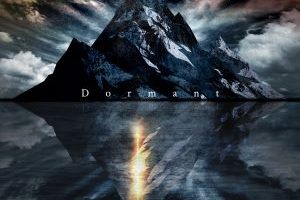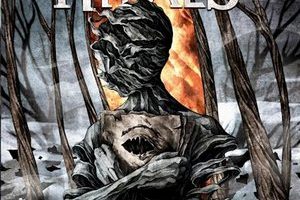Hiraes – Solitary Beginnings
Sunday, 4th July 2021
After long-running act Dawn of Disease called it quits, four of the members (Lukas Kerk, Oliver Kirchner, Christian Wösten and Mathias Blässe) merged together with vocalist Britta Görtz (Critical Mass) to create a new death metal act in Hiraes. Formed and recording their debut in the global pandemic, as things begin to open up, their Napalm Records debut in Solitary is also set to hit the streets running. We spoke with guitarist Lukas Kerk and Britta Görtz to get their thoughts on how the band came together, their goals and inspirations, and much more.
Dead Rhetoric: Hiraes is essentially Dawn of Disease plus Britta [Görtz] on vocals. How’d things get pulled together between the five of you?
Lukas Kerk: Somewhere towards the end of 2019 we realized the expectations regarding the band had diverged over time. We decided to split up Dawn of Disease but we already knew that the four of us wanted to make music together, without Tomas [Wisniewski]. So in the beginning of 2020, when looking for a new singer Britta immediately came into our minds. We knew her from the past with Cripper as well as Critical Mass. So we asked her to join us and that’s when Hiraes came into being.
Dead Rhetoric: Are you looking at this as Dawn of Disease heading in a different direction, or are you just trying to separate yourselves from it at this point?
Kerk: It’s hard to completely separate since I am the main songwriter, as I was in Dawn of Disease. It’s pretty clear that you can hear that I still write the songs, but I have to say, we regard this as something completely new. It’s a new band, and when it comes to songwriting, I feel a bit more open with it. In Dawn of Disease, I was focused on writing songs that were pretty much rooted in the old school Swedish death metal sound. In Hiraes, we still have Scandinavian influences but not as much, and not as old school. So it sounds more modern and a bit newer. It’s a bit more open-minded in general.
Dead Rhetoric: What are some of the lyrical inspirations for Solitary?
Britta Görtz: I would say that overall they turned out to be very personal, and personally-inspired. When I write lyrics I don’t have a particular topic in mind: I just let go and let flow. The process was more that Lukas wrote the songs and sent it over to our drummer Mathias [Blässe] and then I would get a rough demo. I would play it loud in the rehearsal room and start phrasing gibberish on it. Then all of a sudden, the lyrics emerged. I did not plan ahead, so whenever came out, I let out.
The lyrics are probably more on the darker side of life, because it’s easier to write about darker stuff than to write about shiny and happy. This morning I just woke up and felt great – end of song [laughs]! I tried to give every lyric a positive outlook. For “Grain of Sand,” which is about starting over after your life has fallen apart, you are sitting there with your grain of sand in your hand and rebuild. It’s always a mixture of melancholy, a difficult phase, but then becoming aware of your own power and starting to move forward without looking back.
Dead Rhetoric: What can you say about Solitary as your first album?
Görtz: For one, it will always be the album we wrote during a global pandemic. I sat down the other day and tried to go through everything that happened in that phase again. Being born [the band] in the pandemic, and having written an album in the pandemic, to me feels like making the most out of a bad situation. So when I think of the album, I feel very positive about it. Things have been taken away, but as creative people we were able to make something. So that comes to mind. Probably for Lukas it’s more of a fresh start, or close of a chapter?
Kerk: Definitely – closing the Dawn of Disease chapter and starting over with something new in terms of songwriting. To talk about Solitary, in my opinion, it’s a great album. It has many great aspects and different elements. It’s our first album, so we wanted it to be really good so we would get a good start. We really invested a lot of time into it, maybe 10 months, but we did our best. It’s a cool melodic death metal album.
Görtz: From my side, I must say that I’m just starting to be able to enjoy the album. There’s enough distance from when the album was finished that I can look at it. Now that we are getting ready to play live shows, the songs are really coming to life. It’s changing how I perceive the album. I have an outside perspective now that I didn’t have a few weeks ago.
Dead Rhetoric: Knowing that both of you have been in other bands through the years, does it help spark the creative flow without being stuck in a box as a new band?
Kerk: I think that’s an important effect. We aren’t forced to stay in a certain genre. Of course, it’s melodic death metal but there is more to the music, and we are all musicians who have been playing in different bands. It feels good to make music with such great musicians that we all really like. It’s just a good feeling.
Görtz: For me, it’s one big playground because I have never sung in such a melodic band. I’m discovering new territories both lyrically and vocally. It’s something completely different than my work for Critical Mass. It’s a relief. At first, I was wondering how I would know if it would be for either band when I wrote something, but there’s no doubt – it’s almost opposite almost compared to Critical Mass.
Dead Rhetoric: What advantages are there when you have a group of veteran players starting a new band?
Görtz: Definitely! Especially when you can’t sit together and write songs. We are spread across the northern part of Germany. We don’t live in the same city. We also couldn’t meet due to the pandemic. Also, in the production process, everyone of us worked in our own studio and recorded by ourselves. Having the experience and to know that, in my case, I am capable of producing with high-end engineering and doing my vocals by myself and instead of sending it to a well-known studio. It’s something I can totally rely on. Even though it was a lot of work, there’s this mountain of things to do, you know that you can climb that mountain and make it to the top. That’s where my experience didn’t allow me to feel any fear of the tasks.
Kerk: It would have been very funny for all of us to record an album in the pandemic, it probably wouldn’t have worked at all [laughs]!
Görtz: Especially with the drums! When I remember how we recorded drums the first time I ever recorded drums, it was horrible [laughs]!
Dead Rhetoric: What do you feel it takes to stand out as a band playing this style of melodic death metal in today’s world?
Görtz: It’s difficult to say. I don’t spend much thought on that, because I try to be as authentic I can possibly be. I rely on the fact that there’s only one me on this planet, and therefore I can find my own style. Maybe I’ll be lucky and people will look at what we do and people will say it sounds unique. It’s difficult in itself to let your own personality shine through, because it’s stripping everything down to your soul. It’s like, “this is my life, these are my problems.” But that’s honestly the only thing I’m focusing on when I write music.
Dead Rhetoric: Britta, you recently did a Zoom online workshop for vocals. Is this something you enjoy outside of singing?
Görtz: I enjoy it a lot. It’s my profession. I teach that for a living. I became self-employed, 100%, on the first of January, 2020. I had my whole year booked with workshops and then the pandemic happened. I had to switch completely to online lessons. I have had online students for about four years now, simply because of the fact that it’s rare to find a teacher in these harsh/guttural vocal styles. People from all around the world come to me, and usually I round it up with giving one-on-one workshops and also having 15-20 people in one place. But I couldn’t do that, so as the pandemic stuck around, I tried to do that online and it worked well. But the teaching aspect is a very rewarding thing. Screaming is a lot of fun, and accompanying people on their way – how to scream and fill the air with growls – they just lit up when they figure it out. The other thing is that I learn a lot about my own vocals because I explain a lot and dig in deep. I really enjoy my job.
Dead Rhetoric: What do you enjoy about death metal, or heavier music in general?
Kerk: It’s simply just great music I think. When it comes to the transport of emotions, music is the best medium. Every kind of emotion can be transported by music, especially in harder music. We have a lot of emotions. If I was to look at our music in this way, this combination of hard and heavy riffing and fast drumming with melodies and melancholy, it’s an interesting mixture. You have these contradictory poles in our music that I really like. I also like that when listening to bands, for example, Insomnium or At the Gates. They have this combination of melodies and heavy riffing that I really enjoy.
Görtz: There’s a lot of energy floating around. It’s intense music, that’s what is appealing to me with heavier music.
Dead Rhetoric: What other passions do the two of you have outside of metal?
Görtz: I enjoy riding my motorcycle. These days I don’t have much time but I’m planning a trip that I’m really looking forward to. It’s funny, both riding a motorcycle and being on stage, they are the only two things I can do while just being in the moment and not thinking about anything else. My focus is solely on what I am doing.
Kerk: For me, it’s hard to answer because my life is all about music. I like to listen to music, I like to play music, and it’s hard to find time to do something else [laughs]. We have a dog at home. I go out with him a few times a day, so just walking around in the forest and the fields and getting some fresh air is nice, but music is my main passion.
Dead Rhetoric: With this being a new band that you are getting off of the ground, do you have any goals you want to achieve?
Kerk: In general, it would be good to reach as many people as possible with our music. Another goal, hopefully a close one, is to finally get on stage when the pandemic winds down. We actually have a live show, which is streaming, which will be our first show. We are planning for shows if it is possible. A goal is to play festivals and tours, and release many albums to make Hiraes a bigger band than it is now. We really want to start something great, we are having so much fun together.
Görtz: I want to play live as much as possible. I have never had the opportunity to tour overseas, and with Hiraes we have this really great start with this big label. I’m really hoping that maybe, the one thing on my bucket list, touring overseas extensively and playing as support for another band. That’s my goal.
Dead Rhetoric: It has to be interesting to know that your first live show will be a streamed one with no one live in the audience.
Görtz: Yeah, but what can we do? As a band in the middle a pandemic, it’s almost mandatory that you have to do that [laughs]! It’s the initiation ritual for this band [laughs]!
Dead Rhetoric: Ideally, what would be a good band for you to provide support for?
Kerk: There are the typical bands like Hypocrisy, Amon Amarth, or At the Gates. Bands like that would be perfect for us because the fans that really like their music, and ours being similar, that would be great. But we will see what the future will bring.
Dead Rhetoric: What are you looking forward to as the world opens up again?
Görtz: Just to exchange energy with a live audience. To see happy, festival dust and see dirty faces filled with joy. I have never gotten so much feedback on lyrics before, like I did for “Under Fire.” The songs seemed to have touched many people so far, so I really look forward to presenting it live and seeing people singing my lyrics back to me – that’s an overwhelming feeling that I really enjoy. To be able to joy to other people’s lives and to get that as a reward for putting good songwriting in, that’s what I’m really looking forward to. And having beers with bands that I haven’t seen in two festival seasons. I’m looking forward to that too. We will all be old and fat, but that’s okay [laughs]!
Kerk: That’s really an important thing to me personally. To give some hugs and have drinks together – it was simply great when you played a show and then the people would come and ask for pictures and have a drink together. This has been missing. Not just for shows we play – we are all fans of music and going to concerts as fans, so it will be great to get out to some shows as fans. Maybe in the near future it will be possible.
Görtz: I just went downtown and bought socks the other day. I just walked into a store and bought socks. I was standing outside with my socks and it was a world wonder! Wow, I went into a store and it was open [laughs]! Doing something ordinary like buying socks becomes an event.
Dead Rhetoric: Is there an experience with the band that kind of sticks out in your mind?
Kerk: The formation of this band. It was a really great experience and I’m very happy with it. Last year in August, we shot the video for “Under Fire,” which was also a great experience. We had all of these flames around us and it was a hot, summer night. We hadn’t done that before. We never used flames in a video before. This whole Hiraes package makes me personally very happy.
Görtz: The chemistry of the band is just great. Probably many people say that but it’s the truth. It’s awesome. I would also mention the video for “Under Fire” because it feels pretty rock and roll when you stand there with 6-7 feet flames coming out of every corner and you are in the middle performing. It’s awesome! You can’t be more metal [laughs]!
Dead Rhetoric: Is there anything in the world right now that you are frustrated with, aside from the pandemic?
Görtz: Probably a lot, but it all comes down to misunderstandings – they make me very sad when they are played out in the wrong way. Or when politicians use misunderstandings as a way to purposely do things for their own benefit instead of talking openly with each other and trying to solve a problem. Very often, there seems to be reasons behind their actions that aren’t what they are saying as a reason. This is really eating away at democracy in some parts of the world and hindering other countries that don’t have democracy from further developing their political system there. That makes me sad – the imbalance makes me sad and worried.
With the pandemic, all of the bad in the world has just come to the surface and you can see it. I look at France, and all of a sudden I realize that the differences between France and Germany in the health system led to dramatically more death in France than in Germany. These are our neighbors! I have never felt so blessed and lucky to be born in a certain country. I couldn’t do anything about being born in Germany, but I feel lucky and I feel like I need to give back somehow. I am rethinking things in my life.
Dead Rhetoric: You mentioned the streaming show, what plans do you have for the rest of the year?
Görtz: We have many shows planned but nothing announced, due to the current situation. It looks like we might have two or three shows in July but we aren’t sure yet. We are also talking about tours already. Things are picking up speed again, and our booker is very eager to provide us with as many shows as possible. There’s a lot of stuff going on that we can release in the next few weeks.

























